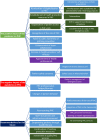The impact of COVID-19 pandemic on Primary Health Care through 'health providers' eyes': Α qualitative study of focus groups and individual interviews in Greece
- PMID: 39052024
- PMCID: PMC11275516
- DOI: 10.1080/13814788.2024.2382218
The impact of COVID-19 pandemic on Primary Health Care through 'health providers' eyes': Α qualitative study of focus groups and individual interviews in Greece
Abstract
Background: Primary Health Care (PHC) was the cornerstone of the pandemic response.
Objectives: We aimed to explore the positive and negative impact of the pandemic, during its final wave, through 'PHC providers' eyes', as well as their recommendations towards restructuring and enhancing PHC services.
Methods: A two-phase qualitative study was conducted, pursuing data triangulation from Focus Groups (FGs) and individual, semi-structured interviews for the purposes of data completeness and confirmation (summer 2022 and spring 2023, respectively). A purposive sample of settings was employed, including in total five PHC units according to location with different population distribution; one in Athens (FGs) and four in Northern Greece (interviews). Inductive content analysis was used.
Results: In total, 24 PHC professionals participated in FGs, whereas 17 were individually interviewed. Our findings reflect a general understanding of the pandemic's positive imprint, namely acceleration of digitalisation, establishment of health protection measures, recognition of PHC's role, raise in public awareness of primary prevention, team-cooperation, increase in providers' self-efficacy, appointment of health professionals and re-organisation of accessibility. The negative impact is summarised in fatigue/burnout in PHC providers, patient safety concerns and changes in patients' behaviour. To increase resilience, participants suggest restructuring PHC, recruiting PHC personnel and enhancing digital infrastructure, maintenance of sanitary protection measures, investment in quality, and empowering patients through health literacy.
Conclusion: Based on the lessons learnt, building further on the pandemic-accelerated digitalisation, emphasising on quality improvement and patient safety, ensuring providers' well-being, and empowering citizens through health literacy could be key in promoting PHC resilience.
Keywords: COVID-19 pandemic; Greece; Primary Health Care; experiences; health providers; qualitative.
Plain language summary
PHC could build upon digitalisation, its role’s recognition, establishment of protective measures, raise in public awareness of primary prevention, team-cooperation and providers’ self-efficacy that the pandemic brought.Emphasising on quality improvement and patient safety, promoting professionals’ well-being and empowering citizens through health literacy could be key in strengthening PHC resilience.
Conflict of interest statement
No potential conflict of interest was reported by the author(s).
Figures

Similar articles
-
Primary healthcare providers challenged during the COVID-19 pandemic: a qualitative study.BMC Prim Care. 2022 Dec 3;23(1):310. doi: 10.1186/s12875-022-01923-4. BMC Prim Care. 2022. PMID: 36463103 Free PMC article.
-
Perceptions of primary care professionals on quality of services in rural Greece: a qualitative study.Rural Remote Health. 2012;12:2156. Epub 2012 Oct 22. Rural Remote Health. 2012. PMID: 23102408
-
The impact of COVID-19 on patient engagement with primary healthcare: lessons from the saudi primary care setting.BMC Prim Care. 2023 Sep 6;24(1):177. doi: 10.1186/s12875-023-02131-4. BMC Prim Care. 2023. PMID: 37674122 Free PMC article.
-
Coping and compromise: a qualitative study of how primary health care providers respond to health reform in China.Hum Resour Health. 2017 Aug 4;15(1):50. doi: 10.1186/s12960-017-0226-z. Hum Resour Health. 2017. PMID: 28778199 Free PMC article.
-
Healthcare Provider Advocacy for Primary Health Care Strengthening: A Call for Action.J Prim Care Community Health. 2022 Jan-Dec;13:21501319221078379. doi: 10.1177/21501319221078379. J Prim Care Community Health. 2022. PMID: 35289207 Free PMC article. Review.
References
-
- World Health Organisation [Internet] . Third round of the global pulse survey on continuity of essential health services during the COVID-19 pandemic: Interim report - November–December 2021; 2022. February 7. Available from: https://www.who.int/publications/i/item/WHO-2019-nCoV-EHS_continuity-sur....
-
- Kovačec S, Klemenc-Ketiš Z, Poplas-Susič A, et al. Experience and views of primary care physicians involved in reorganisation of care in family medicine practices during COVID-19 pandemic: a qualitative study from Slovenia. Eur J Gen Pract. 2023;29(2):2193886. doi: 10.1080/13814788.2023.2193886. - DOI - PMC - PubMed
MeSH terms
LinkOut - more resources
Full Text Sources
Other Literature Sources
Medical
